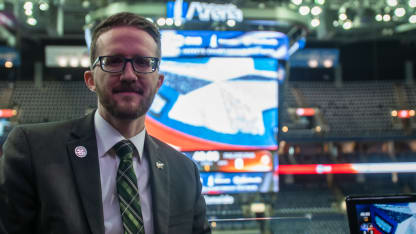As Matt Duchene scored his first goal for the Columbus Blue Jackets in his home debut Saturday night, the more than 19,000 fans in the sellout crowd at Nationwide Arena rose to their feet in unison to celebrate.
Just one of them knew how much went into getting Duchene on the ice for that moment.
Blue Jackets director of legal affairs Peter Lovins spearheaded the effort one day earlier to get Duchene, a native of Ontario, the visa he needed to be able to suit up for Columbus in that game vs. San Jose.
It was an effort that Lovins alternately describes as a "Hail Mary" and a "magic show," as it took a number of members of the Blue Jackets organization working together, about 100 emails, plus what one would have to think is an understanding member of the United States Customs and Immigration Service, to make it happen.
Behind-the-scenes work got Duchene eligible to play for Jackets
Team effort from Columbus organization yielded big results

© Jamie Sabau
"It was an all-time day," Lovins said.
And to think, Lovins expected the craziest part of his Friday to be a furniture delivery that caused him to leave the office and head home just after he got to work (those 8-11 a.m. delivery windows can be a pain).
It all started when Lovins received a text from Blue Jackets' director of hockey administration Josh Flynn at 9:57 a.m. saying the team was close to making a trade and asking if the team's legal department could help procure a visa in time for Saturday's home game. Within a couple short hours, he would be on a plane to Vermont.
Flynn didn't tell Lovins who the player was at first, but it turned out to be Duchene, whose status as a Canadian player on a Canadian team, the Ottawa Senators, complicated things. That double-whammy is tough, as Duchene is a foreign national who didn't already have a visa -- the P-1 visa given to athletes who perform outside of their native country -- to work in the United States.
For example, Monday's trade for Prince Edward Island native Adam McQuaid was much easier from an immigration standpoint because the defenseman was playing in the U.S. for New York Rangers, and the team has 30 days to apply for his visa since he was already playing in the country.

© Blue Jackets/Anthony Allocco
With Duchene, there was no such luck, and an expedited review from the USCIS to process such cases often takes closer to 48 hours -- and that's in business days. With the deal being completed on a Friday, it didn't look good.
In other words, Lovins said, his initial answer to Flynn was no.
"My response was, 'Not until Monday at the absolute earliest, and that is in no way guaranteed,'" Lovins said.
Even the 48-hour window is an expedited time frame, as a P-1 visa usually takes four to six months to obtain. For an extra fee, a premium processing service is offered that cuts that down to 15 days, but given the nature of sports contracts and the need to get players in the lineup for their teams, the lone processing office for P-1 visas -- which is located in St. Albans, Vermont, near the Canadian border -- will do an expedited review in transactional situations.
"That's where we like to stop and say, 'All right, we appreciate you respecting the urgency, two days is perfect for us,'" Lovins said. "If you accelerate it even beyond that, that's when you start getting into doing crazy things like we did."
So how crazy was it? Well, like we said, it was a team effort. Lovins immediately started working on Duchene's application paperwork once he knew the Senators forward was the player the Jackets were acquiring, coordinating his work with senior vice president/general counsel Greg Kirstein and both a local outside counsel and a Boston firm that helps the team with immigration work.
Director of human resources Becky Magaw pitched in as well, while team manager of communications Glenn Odebralski sent over his draft press release to include as proof Duchene was joining the organization. Flynn and director of team services Julie Gamble also did their part to get Lovins the necessary information.
"At one point I was on my work phone, I don't remember who I was talking to, someone else was calling in, and Julie Gamble is calling my cell phone," Lovins said. "I was doing one of those things where I had a phone in each ear."
As Lovins was flying through the paperwork needed, others were tackling the logistics of the more difficult part of the equation -- getting the paperwork to St. Albans so it could be filed with the office. The only option? For Lovins to get on a plane to Burlington, Vermont, to hand-deliver it.
So he did, leaving the Ohio State University Airport at 1:30 p.m.
"I've only ever flown coach," Lovins said. "So I went from coach to a private jet by myself. It was this 15-seater with just me and the two pilots, and I had the entire plane to myself."
Lovins completed the application on the plane, scattering his documents across the cabin to make sure it was prepared properly, then got it to a courier on the ground in Burlington, Vermont, by 3. At 3:30, the team heard USCIS had received the petition for review, just 90 minutes before it was set to close up shop for the weekend. At that point, there was no guarantee a decision would be made by the end of the business day.
In the meantime, general manager Jarmo Kekalainen was meeting with the media to discuss the Duchene trade. At one point, he was asked if Duchene would be able to play Saturday because of the immigration process.
"I know we have great people on it," Kekalainen said. "They're working on it and we're putting all of our resources into that process, so I don't think there's anything more that we could've done. Peter Lovins is handling it and our legal department is taking care of it, as I said, to make that happen today, so that he can play tomorrow."
Finally, the moment of truth came at 5:17 p.m. -- the Jackets learned the USCIS office had approved Duchene's application. He would be able to play against the Sharks.
The Hail Mary had worked.
"I'm pretty grateful because I'm excited to play tomorrow," Duchene said afterward.
It was another victory for Lovins, who went through a similar process a year ago to get Mark Letestu -- whom the Blue Jackets acquired on a Sunday -- eligible to play in a Monday home game (for the record, Letestu scored a goal in that game as well).
The 34-year-old grew up a sports fan in Fairbanks, Alaska, which is located in the heart of the state, just 200 miles south of the Arctic Circle. The average high is 1 degree in January and the average low that month is minus-17.
"My elementary school had an ice rink in the recess area so in winter, because winter was so long there, they'd just spray it down and you could bring skates at recess," Lovins said.
He grew up playing soccer and basketball before deciding to pursue sports law as he got older. Lovins eventually attended Ohio State's Moritz College of Law, then joined the Blue Jackets after graduation.
Lovins works in a two-person in-house legal department with Kirstein, and his job duties entail a little bit of everything.
"If you're an attorney at a large corporation, for example, you specialize," he said. "You may be a real estate attorney, you may be a litigation attorney, you may be an intellectual property attorney. You become an expert in that area, and that's great, but that's all you do.
"Because we're a small, in-house legal department, we cover the gamut of areas of the law from immigration to transactional contracts to employment to premise liability every time we have people in the building to intellectual property. We get to touch all of it and keep it very fresh."
Sometimes, that might even lead to one of the craziest Fridays you'll ever have -- and a Saturday to remember.
















